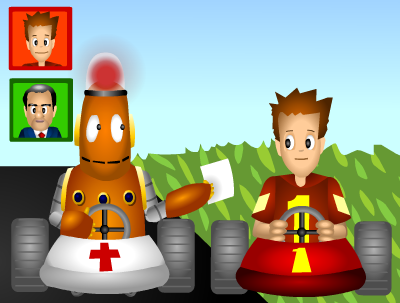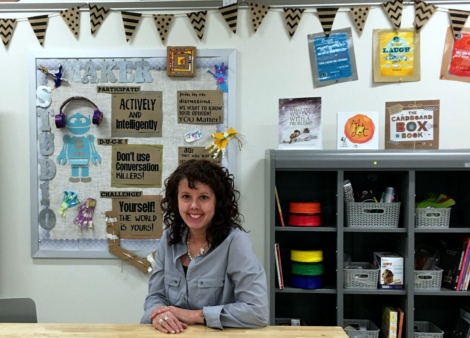
Guest Blogger: Doug Bergman Shares His Reflection on Using GameUp Games in Computer Science
Posted by cemignano on
Thinking about using games in computer science? Check out what blogger Doug Bergman has to say! Doug Bergman is a teacher at Porter-Gaud School in Charleston, South Carolina. He’s been teaching for almost 20 years, the majority of that in Computer Science.
Since my first day of teaching, I’ve led hands-on, project-based classes simply because it made sense. The best way to describe my classes would be “structured, but chaotic with a side order of energy”. I got my B.S. from Clemson University & M.A. from University of South Carolina. I bring a unique perspective to education as I am a product of 12 years in the public school world, but have spent the last 20 years in the independent school world, plus a few years in industry. I’ve attended school as a student while living in France and I’ve taught school while living in Japan, so I’ve experienced education in a wide variety of ways. Additionally, I’ve traveled extensively in over 23 countries.
Students in one of our computer science classes have perhaps the coolest homework assignment EVER! They are required to find and play games on BrainPOP . They actually have to analyze them in more than 25 dimensions. Why? To find out the elements of what makes a good game, especially educational games. Throughout our 4 year Computer Science program, students will make a variety of “serious games”. Even in our intro class, students will write several hundred lines of code in their first hand-coded game! Each game must have a social cause that it addresses, so the kids get a chance to express themselves in a project-based, hands-on, engaging, and educational experience. What we know is that games WORK! Students love games, so why not tap into the raw energy and use that to help students connect with the real world, as well as educate in areas such as Computer Science.
The goal of our entire computer Science program is to introduce people to, and bring them into the technological world. We have completely changed the way that we deliver class, meaning we are all project based, hands-on, and real world. Our projects are engaging and large projects that address real world issues. Of course they learn programming and Computer Science as part of that experience, but more so they learn to solve and address problems with digital solutions. What we’ve found is that the traditional way of lecture, note taking, and textbook driven class has not been the most effective way to reach students, especially female students as we see the percent of females drop dramatically in the middle and high school years. But, we find that actually our girls are excellent at this, love being able to create their own programs, and realize that Computer Science helps them distinguish themselves from peers not only in the college admissions, but also in the world. So, it was additionally gratifying as a teacher to have been recognized by NCWIT with this year’s Educator Award for South Carolina. The award is given annually to teachers “…who play a pivotal role in helping to encourage the young women to continue exploring their interest in computing and technology.”
We’re seeing tremendous success from our program! Each year, the National Center for Women & Information Technology recognizes female students, both at the national level and state level, for their interest in and achievement in computing and technology. It’s especially targeting at high school girls to encourage them to enter into STEM majors in college. This year, our very own Porter-Gaud students Jenny Ulber and Elen Edelson were selected as 2 (of 5) South Carolina NCWIT award winners. Jenny was additionally selected as runner up for their national award as well! Jenny and Elen have both designed apps for Android Phones and designed professional quality full functioning websites on their own Apache webserver.
Over the last few years, we’ve been excited to have been able to present about our program at several conferences both nationally and internationally. In 2011, our Xbox game design class was selected as 1 of 9 projects to represent the U.S. at the Microsoft Global Innovator Forum, sponsored by their incredible team of their Partners-In-Learning program.
All of this is part of a larger effort to bring Computer Science to the forefront of education. In a digital world as dynamic as the one we live in, the leaders of research, business, education, politics, and philanthropy will be the ones who command the technology to address and solve the problems we face. Computer Science prepares students to do just that. Sites like BrainPOP support that mission so well! We look forward to a time where Computer Science is as core to our educational system as language, math, and science.














